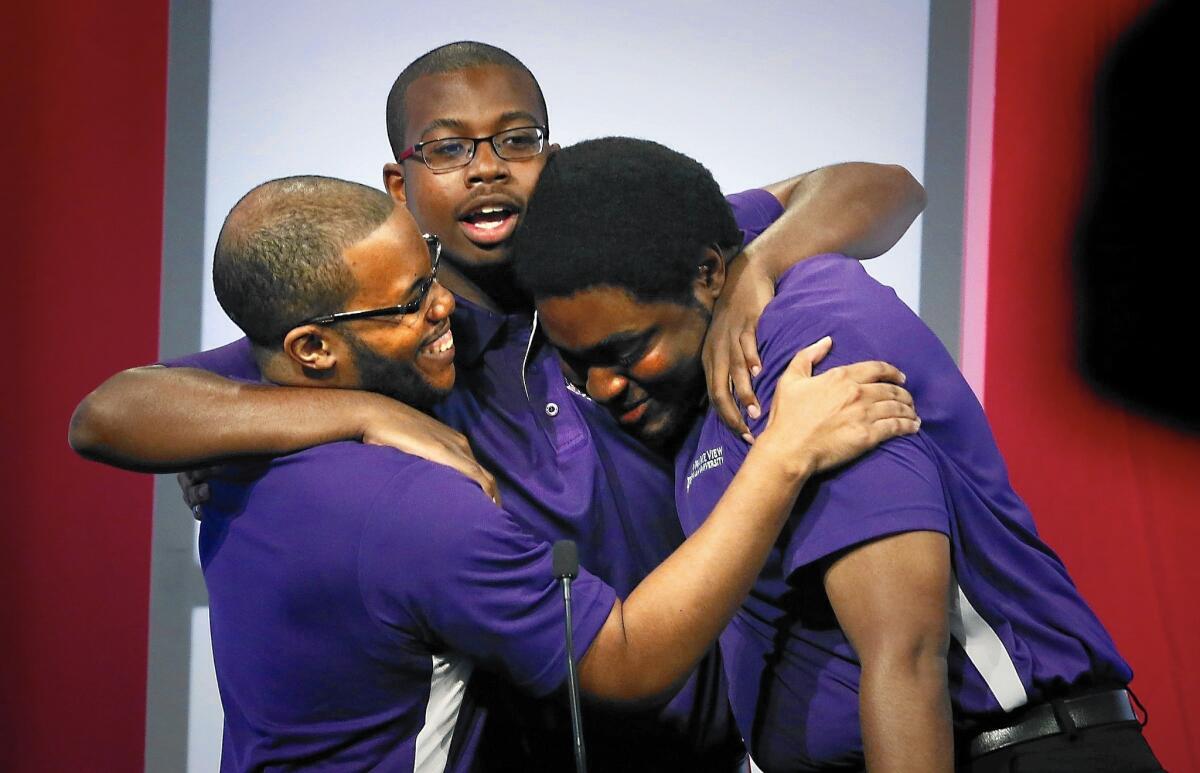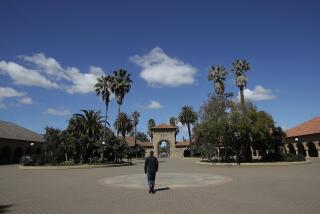For historically black colleges, quiz bowl can mean higher profile

When D’Ondre Swails went to college, he looked for a way to replicate the energy and team spirit he had when he ran varsity track in high school. At the historically black, all-male Morehouse College in Atlanta, he discovered the world of quiz bowl.
“It was a replacement for my competitive nature from high school, but something that directly related to being a student,” said Swails, 21, of Vallejo, Calif.
The ability to compete to win money for his school was an added bonus.
Amid a national conversation about the relevance of historically black colleges and universities, Swails and more than 200 other students from black colleges met in Torrance last week to compete in an annual quiz bowl competition. The grueling battle of intellect provides thousands of dollars in grant money to the competing schools, many of whose students have difficulty paying for college and graduating.
“Every semester I’m pushing for resources to keep 300 to 400 students in school,” said Cynthia Warrick, president of Grambling State University in Louisiana. “Efforts like this, that can help these students who are working so hard, are important and should be enhanced.”
There are 105 historically black colleges and universities nationwide, mostly in the South and on the East Coast. Such institutions were founded after the Civil War to serve African Americans who were denied admission to other colleges. In recent years, many of these campuses have had financial problems caused by fluctuating government support, alleged mismanagement of funds or low rates of giving by alumni. And though non-black students are welcome, enrollment is low and graduation rates are lagging.
The Obama administration has made efforts to support the work of black colleges, most recently announcing $25 million in funding for cybersecurity education at these schools. But with mounting student loan debt and President Obama’s proposal to make the first two years of community college free, advocates for black colleges say the support is not enough.
To David Wilson, president of Morgan State University in Baltimore, the academic contest is one way to demonstrate the benefits of a historically black college education and the support such schools are due.
To win the Honda Campus All-Star Challenge, students must master a variety of topics, such as elements on the periodic table and the least-known characters of the Bible. By the time the qualifying 48 teams arrived in California this year, they had already bested a set of opponents in regional competitions.
After two days of head-to-head intellectual sparring, two schools come out on top for the final round. This year, Prairie View Agricultural and Mechanical University in Texas trumped Pennsylvania’s Cheyney University to take home the $50,000 grand prize.
For two-time challenge winner Morgan State, the financial support of the program has a direct effect on students, Wilson said. All of the nearly $200,000 the school has amassed through its participation over the years has been used to ensure team members and other students can complete their degrees without undue financial burden.
Honda, in partnership with the College Bowl Co., has sponsored the All-Star Challenge for over 26 years, directly funneling more than $7.5 million to these schools.
In addition to the financial assistance, Alabama State University President Gwendolyn Boyd said, the competition helps to erase misconceptions some people have about black schools, mainly that they are a default for students who can’t make it in larger, predominantly white institutions.
“For most of our schools, we have a stereotype that [our students] are the exception,” she said. “We want them to know that we have exceptional students, who will go on to do great things.”
Warrick agreed, saying that black schools must change these false impressions.
“This type of competition dispels that perception because you can see the knowledge base and the competitiveness firsthand,” she said. “Even though we are not well-financed, we are still producing products that the nation and world need.”
Questioning the necessity of black colleges is futile, Wilson said. With minorities comprising a growing percentage of the national population, black colleges and universities should be at the center of the education conversation, he added, not on the periphery where they often find themselves.
“If America is really going to lead the world again in educational attainment, it will have to hold high those institutions that have been [educating minorities] for 150 years of our country,” he said.
But financial support is needed to continue such work. Warrick said the schools need to highlight academics as much as athletics.
“The same level of attention that we give to sports, we need to give to the intellectual capital that we have in these colleges,” she said.
Twitter: @TrevellAnderson
More to Read
Sign up for Essential California
The most important California stories and recommendations in your inbox every morning.
You may occasionally receive promotional content from the Los Angeles Times.










